#henotheistic traditions
Text

What did Roman Empire pagan soldiers think of fighting under Constantine and Christianity?
Probably not very much.
The Roman military was a world of its own. More than today, soldiers had their very identity shaped by the institution and people they served. Upon enlisting, they swore allegiance to the emperor and received new names as his servants — Valerius during the tetrarchy and Flavius under Constantine. Those who didn’t speak Latin were pushed to acquire a basic grasp of it, pretty much like the French Foreign Legion of today. Starting from the late republican period, Roman soldiers were accustomed to receiving salaries, booty and pensions from their commanders, not the state in an abstract sense. Under the empire, loyalty often lay with the emperor, as long as he was perceived as strong.
In that frame, Constantine never lost the faith of his men thanks to his talents, accomplishments and image. It surely helped that he was Constantius Chlorus’ son, but dynastic feelings were not so strong in the 4th c. What really mattered was that he was a victorious imperator, with plenty of experience both before and after his ascension. His CV included wars against, and victories over, foreigners (Franks, Goths, Alamanni) and rival emperors (Maxentius, Licinius) alike. That kept soldiers satisfied and himself secure on the throne. Besides, Constantine took care to associate his military exploits with the Christian God. On the contrary, his sons failed to live up to his legacy and had to face claims by men like Magnus Magnentius and Julian.
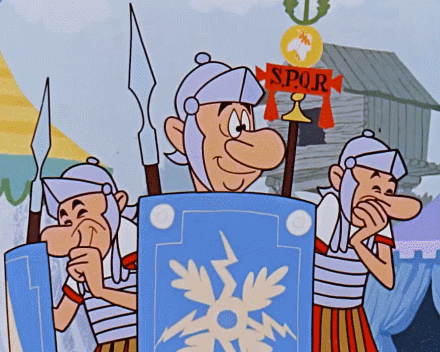
Another thing to consider is the role of religion in the then Roman military. In general, early Christianity wasn’t unanimously for or against military service, hence a decent minority of soliders were Christians even before Constantine. In the late 3rd c., you could find Christians like St. Marcellus holding even the rank of centurion. The statesman Cassius Dio is reported to have spoken of Christians in the comitatus of all four original tetrarchs. Cases of individual disobedience cannot be excluded, of course, but the military was, above all, a state mechanism. Under Diocletian, they persecuted Christians; under Constantine, they fought the Donatists and may have even destroyed the Asclepieion at Aegae, Cilicia.
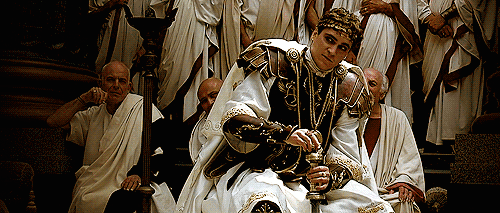
On his part, Constantine didn’t adopt Christianity the way most people after his time imagine(d). There was a long, gradual process, for the most part inscribed into the norms of late antiquity. Nomenclature and visual language were preserved to a considerable extent. Separate Christian and non-Christian prayers are reported to have been taking place at the same time. At some point in the 320s, a group of veterans greeted Constantine with the traditional “May the gods preserve you for us” salute. Two elite army units, Diocletian’s Jovians and Maximian’s Herculians, were not rebranded, although their names recalled the gods Jupiter and Hercules whom the late tetrarchs associated themselves with.
With the benefit of hindsight, we now know that the dynamics of that complex situation ended up favouring Christianity — if anything, all of Constantine’s successors were Christians except for Julian. That, however, should not be taken out of context. Few have a panoramic view of their time or the acumen to predict the future, and the provincials who made up the bulk of the late Roman military were not among them. Even if they were, though, they may not have had particularly strong feelings about any potential outcome. At the same time, various (quasi-)henotheistic traditions like the cult of Sol Invictus and Mithraism were around. The period was transitional, hence quite fluid.
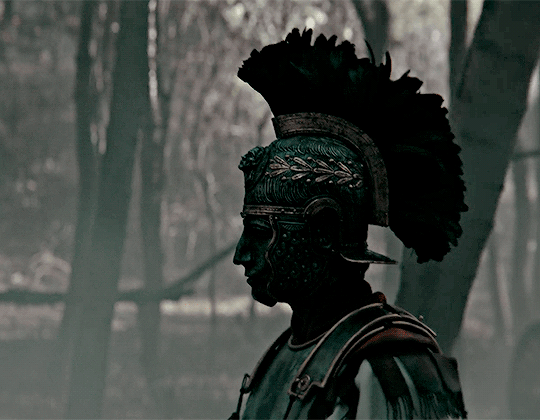
#kemetic dreams#european#europeans#western europe#christianity#roman military#henotheistic traditions#cult of sol invictus#mithraism#christians#constantine
8 notes
·
View notes
Text
[Part 1+prompt] [Previous part]
Part 7
The medics were confused by the suggestion until Jana pulled out the holovid again. They passed it to their superiors. They passed it to theirs, who consulted a human medic, who said to check a diagram of human tongue muscles and compare it to a scan of what was at the end of Kiddo's limbs, and only try it if it looked analogous.
Then those scans got passed to superiors, to their superiors, to another human medic who asked why they thought it wouldn't work and pointed out that, if they were so concerned about it, they could try the fingerless hand first since there wasn't much room to make anything worse.
That medic said she was willing to operate if no-one else would. Her assistant was a Vul (the ones born fingerless, who grow them later) and, although they were used to the medic having success with off-the-wall ideas, they asked that for this specific case either Kiddo or Jana make an offering to the Vul god/dess of fingers before they'd feel comfortable with it. Jana considered eirself "an agnostic henotheist," more bothered by the traditional requesting-more-fingers-please offering -- *urp* -- than any notions of blasphemy against eir own religion, and took that responsibility.
The operation itself, and the healing after, were faster than the fussing and paperwork had been. The medic said Peprine healed even faster than humans because they were much, much easier to injure. Yay/boo? She'd also said that, once Kiddo was fully recovered and wouldn't be re-hobbled too badly by the recovery time, she could look at its other hand.
With practice, Kiddo could now open and close the "fingers" like scissors, overlap them with the inner finger on top (but not the other way), and clench them to within about 120 degrees of its arm, which wasn't useful yet but might improve. It could pick up utensils, press buttons, hold certain sizes/shapes of objects... mostly things it could do with the two real fingers on its other hand, and somewhat less finely, but now it had two hands to work with and could, for example, hold a circuit plate firmly enough to not budge it while calibrating the... surge... widget... doohickeys... Jana wasn't really an electrics expert -- ey was planning to sign up for an adult intro class to follow along better, but they weren't held often -- but was happy to listen to Kiddo eagerly describe what it was learning in class!
After that one class, Jana had poked around the instruction scheduling until ey found a place to mark that Kiddo and Binn were not to be in classes together, or to notify em if they were. Some species had to avoid certain other species for medical reasons, or Talts avoided each other for social reasons, so that system already existed, thankfully.
But a ship was a finite space, and no good thing could last forever.
They were in the cafeteria, going down the line, putting a finger or "finger" on the tag for each offering (it would beep, buzz, click, light up, etc in an evaluation of whether a food was good for you, likely to be palatable, or if your species could even eat it) and scooping themselves some dinner when Uvair and Binn came behind them in line.
"Jana! I haven't talked to you since we came home! I see you still have your castoff, it looks like it's grow--"
Jana set the serving spoon down and stepped into her space, teeth bared and voice low. "Uvair. We have been friends so I am doing you the favor of making this warning explicit. I know your fucked-up treatment of disabled kids is a 'protected cultural practice,' for now." There was going to be a remedial diplomacy class in eir future, at minimum, if Uvair tattled about Jana saying that, but there weren't other words. "But human aggression to defend bond-mates is also protected. I held back my human rage when Kiddo said Binn had called it that, and I'm holding it back now. Learn better, teach your kid better, and maybe we can be friends again. Or insult my child again and I won't hold back."
Ey turned sharply, picked up eir tray with one hand and took Kiddo's hand with the other, and walked briskly to a far-off table.
Kiddo set down its tray and tentatively, carefully, hugged em.
[Part 8]
355 notes
·
View notes
Note
If you're Christian isn't the God of Lot's wife omniscient tho?
it's important for christians to see the whole bible as god's revelation, inspired by the holy spirit, speaking to the one same way, truth, and life that is the Word of God himself progressively shown forth through the ages of salvation history.
it's also important for christians to recognize the tanakh as a sacred text for jewish people and respect that tradition of interpretation
and then it's important for anyone who reads the bible to recognize it as a book written by humans in particular times with particular temporally-bound perspectives and understandings of the world: israel does not start out as a monotheistic people-up through the later parts of isaiah traces of polytheism are plentiful; only late do the prophets proclaim that Hashem is the only god who exists, that the idols of the nations do not exist. Most of the old testament is, properly speaking, henotheistic.
so is the God of Lot's wife omniscient to me? yes, insofar as the God being described is the same God I worship. But no, if I'm reading the text attempting to encounter it on its own terms without reading into it.
all these methods of reading are important. i think christians must see both. but it would be dishonest to pretend genesis is--on its own terms--speaking of an omniscient, omnipotent, self-existing Necessary Being in the sense that I understand. the Being it's talking about is all those things of course. but he isn't being presented or understood that way by the text, by the author, and i don't think it's right to erase this other side of God: a "jealous God" who "plucks me out of the mighty waters" with "smoke coming forth from his nostrils," who bargains and pleads with his people, who hasn't lost his traces of early levantine polytheism, and who doesn't necessarily play fair.
10 notes
·
View notes
Text
ABOUT @BACCHANT-OF-DIONYSUS
hi! I’m Dorian, the person who runs this blog. My main account is @neuro-die-virgin so my follows and likes and PMs and asks come from there. I have a patreon linked in my bio where I post exclusive Dionysus related content.
Here’s some basic boundaries and rules of interaction:
Labels I use for myself and what they mean:
Transgender - someone who identifies with a gender other than what they were assigned at birth
FTM - someone transitioning from female to male
Transsexual - another word for transgender but usually applying more to those who seek medical transition to change their sex
Autistic - someone on the autism spectrum
ADHD - someone with attention deficit and/or hyperactivity disorder
Level 2 - a term used by diagnostic professionals to describe an autistic person whose symptom severity and support needs are moderate (as opposed to level 1 or 3, which are low and high, respectively)
Moderate support needs - an autistic person who requires moderate levels of support (generally cannot live alone and needs help with basic tasks like cooking, cleaning and hygiene).
Henotheistic - worshipping one god but believing in the existence of many
Greco-Roman magic - magical practices taken from Ancient Greek and Roman tradition such as gemstone amulets, curse tablets, potions, spells, vocus magae and work with Daemons.
Do not send me asks, talk to me or reblog my posts - thank you:
T*rfs
N*zis and n*zi sympathisers
Folkists
Conservatives
Anyone who likes Ben Shapiro or Matt Walsh
Andrew Tate sympathisers
Anti-feminists
Anti-lgbt folk
LGB who do not include the T
All lives matter sympathisers
Things that will not be tolerated on this blog:
Antisemitism
Anti-Roma racism
General racism
Folkist beliefs
People who invade closed living practices
Coloniser shit
Sexism
Misogyny
Transphobia
Transmisogyny
Queer phobia and homophobia
Pedo apologists
Preaching or attempting to convert to another religion
Toxic love and light rhetoric
Classism
Ableism
Cringe content
Tik tok shit (I’m sick of tik tok)
Sorry for such a long post. It’s just that as this blog gets more popular I thought it was important to lay some ground rules for interaction. Please know I’m a chill person and if you accidentally break a rule I won’t be angry or block you - I’ll just give you a friendly warning. If you have any questions or are confused at all, please send me an ask or a DM. I won’t bite.
Bacchic Blessings and Dionysus be with you!
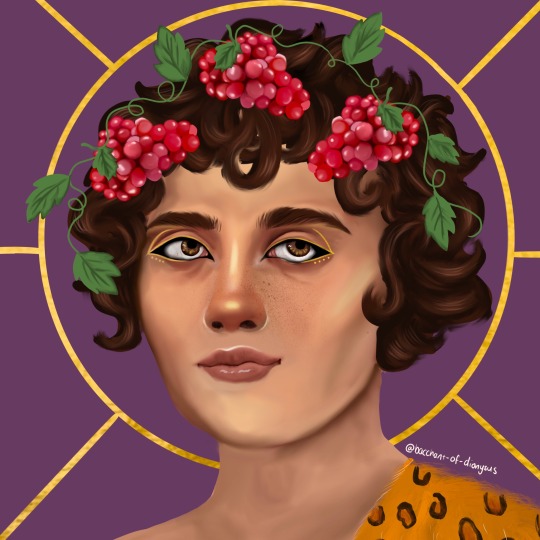

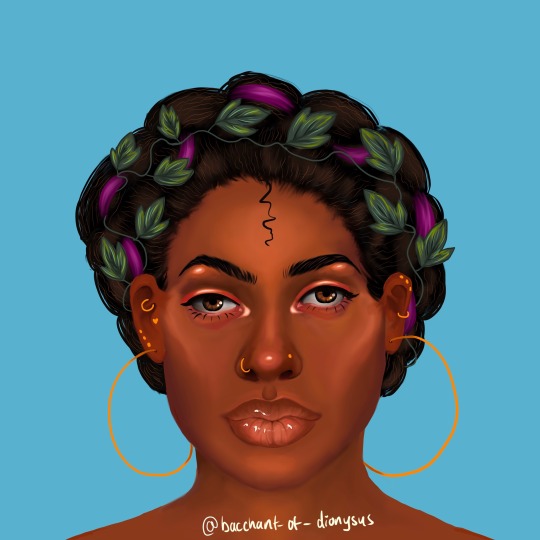
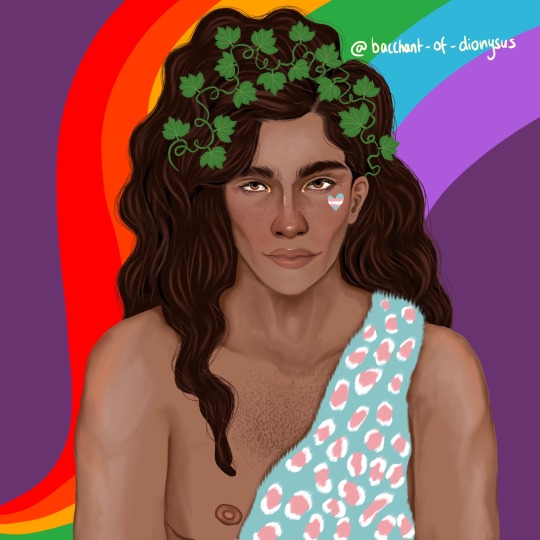
#hellenic polythiest#dionysus#hellenic pagan#bacchus#witchcraft#witch#paganism#greek gods#helpol#hellenic gods#deity worship#devotional#pagan prayer
58 notes
·
View notes
Text
"(...) There is no doubt whatever that Typhon-Set was commonly identified with the sun in the Graeco-Roman period, and not infrequently with Abraxas. Similarly, there are many occasions when Jewish god-names occur in invocations of Typhon-Set. Identification of both Typhon and Dionysus with the Jewish god is also a common theme in late antiquity. Despite assertions by respected reference works, I am not inclined to epitomise every instance of this as anti-Semitism, even though such traits certainly existed. Set had a newly acquired demiurgic and solar-pantheistic status that was evidently sincere, this was neither necessarily or still less inevitably connected to ethnic politics. Similarly, Dionysus was a hugely popular god; identification of him with Eastern deities is perfectly in character, even if controversial due to the status of one in particular (...)
Similarly, magical use of Jewish god-names occasionally incurs accusations of cultural appropriation. Again, the fact is that these names have become traditional; it is however extremely significant that late pagan use of them predates similar Christian usage. While apparently counter-intuitive to modern sensibilities, for an ancient pagan it was perfectly feasible to accommodate figures from henotheist or monotheist cultures. In some cases, particularly in Asia Minor, such accommodation reflected a deep respect for and involvement with Jewish culture, which however stopped short of conversion. On the other hand, there is no necessity to retain wholesale usage of these names; the conceptions of deity involved are not the sole province of any particular theology, and slavish reliance on past forms is no indication of magical competence. Having disposed of this issue in short order, the more immediately reIevant fact here is that Typhon-Set bore the status mentioned. In doing so, he demonstrates the mutability of views of the gods from one epoch to the next, it is a simple fact that perceptions of the nature and attributes of any ancient deity was subject to change. Consequently, the favouritism of one modern pagan grouping or individual for one or other past expression does not render those of another wrong per se. That Typhon-Set preceded Jehovah as premier deity of ceremonial magicians, often invoked under exactly the same names, is both historically true and potentially significant to various modern practitioners, and that is what matters here."
Jake Stratton-Kent, Geosophia or The Argo of Magic, vol. II
#sēt#set#sutekh#sēt-typhon#iaô#syncretism#ceremonial magic#jake stratton-kent#polytheism#greek magical papyri#pgm
16 notes
·
View notes
Note
hello. i saw a video featuring aella then saw your twitter through it. i immediately stopped watching the video as i do not agree with many of their takes, but i would like to understand them without watching a video about kinks through the lens of the political compass. could you possibly explain what gender maximalizing is, what a gynocratic traditionalist is, and what the sphere you operate in is called? Thank you. (there was an article when i looked it up but im not going on medium)
wait what video with Aella am I in lol. anyway most of the things in my Twitter bio are at least partly a bit, do not represent any kind of relevant external movement or phenomenon, and you are not going to find explained anywhere else anyway so. "gender optimizationist" is a kind of contrarian response to the formerly popular position of "gender nihilism", a framework that tried to decentre the discourse of innate identity in justifying/accounting for gender fluidity, transition etc. by basically adopting the maximally deflationist position that gender is entirely an ideological construct covering material oppressive systems but letting people identify & do whatever they want with it is truer to the premise of its abolition than restricting specific behaviours and identities as actually existing "gender". I actually do find this useful to bring up when TERFs claim stuff like "trans people believe in innate gendered souls or what role you fit determines your gender" etc. but still think it concedes too much so my own position of "gender optimization" is like, gender is real at least insofar as something we consciously construct, people's identities aren't less objective than their historical origins and we can and should continue the project of shaping and rebuilding it until we make it something that can accommodate the maximum of everyone possible (and leave exits for people who don't want it)
"gynocratic traditionalism" is not entirely compatible with this and while I didn't take either completely seriously I used to struggle with this more before I got into Thelema and clarified my spirituality & ontology in a lot of ways. for completely personal poetic/psychosexual reasons I was simultaneously inclined to read gender as actually real in a metaphysical/spiritual sense, albeit one that doesn't map to biology or patriarchal gender roles and mostly derives from reading The White Goddess by Robert Graves way too young. almost nobody remembers it now but that book was part of the broader "matriarchal antiquity" trend, a huge influence on Wicca and the New Ageier side of second wave feminism, and argues that the original religious/magickal tradition was the essentially henotheistic worship of a Great Goddess of life, death and nature, who was self-sufficient but produced for her own pleasure a secondary male god who dies and resurrects with the agricultural cycle. human gender is then a reflection of this higher metaphysical order, with woman as the superior term in the hierarchy, and the "warrior" dimensions of masculinity being descended from a form of sacrificial kingship ritually representing the life-death cycle of the Goddess' lover. I'd basically argue the "gender optimizationist" position relative to left queer theory but this relative to right-wing mythopoeic traditionalist accounts of gender, which as an intensely capital-R Romantic personality I did at least get the appeal of and offered it as a "feminist" alternative to. people like RFH have kinda picked up the baton of that now although I have some obvious issues with her framings. I used "gynocratic" instead of matriarchal bc one of the interesting things about Graves' version of this hypothesis is it doesn't actually focus on motherhood and reproduction as much as the wombyn TERF stuff; for instance instead of the more famous Wiccan "maiden/mother/crone" formulation for the Goddess' three aspects he uses "maiden/nymph/crone", implying that the default adulthood stage wasn't necessarily settling down and popping out babies but a freewheeling sexuality where reproduction was an individual choice supported by the community, controlled by abortifacents etc.
should probably clarify that, after quite a bit of going back and forth on it and my Twitter presence was designed to be plausibly deniable in either direction, I am pretty much a low-Kinsey bisexual cis guy who socialized into predominantly queer, especially trans spaces mostly just due to neurodivergence and general nonconformity. a lot of my weird gender politics is subtly in dialogue with MonetizeYourCat-era Tumblr stuff (imo the more honest version of today's mainstream heteropessimism) about whether it's even possible or ethical to exist as that
you didn't mention them but just to have on record re: the other stuff in the bio, "presuppositional leftist" applies the idea of presuppositional apologetics to my left commitments in the sense that they're not premised on any descriptive claim about reality but rather presuppositions of why politics would even matter to me in the first place, and "Canadian materialist" is a joke on Canadian idealism. my Substack bio is more up to date with where I'm at now but I like keeping the Twitter one around bc every now and then someone has a really funny reaction to it
I don't really have a "sphere I operate in" so much as I float around the edges of different subcultures, study them and make friends with people I find interesting. currently I feel like I'm kind of in tpot, kind of in the "irony left" and kind of in parapolitics/esoteric "schizoposting". and also trying to carve out a niche in the online subcultural arts scene: my major passion project rn is my indie press and in particular our serial fiction journal (new issue coming out this month!) featuring two of my novels
9 notes
·
View notes
Note
hello! sorry to bug you. I am a pagan-adjacent generic polytheist non-jew who has had his eye on Judaism for a long time -- Judaism is something of a special interest of mine (although it feels disrespectful to use a term like that, LOL) and a lot of the traditions and beliefs really resonate with me. I have even occasionally considered conversion - but I can't quite shake the conviction I have that multiple deities *do* exist. I was under the assumption that, generally, monotheism is *required* to be a Jew, but after finding your blog I'm wondering about this again. Is a henotheistic (or some other non-monotheistic) approach to Judaism something that really is possible? do you have any resources/recommendations for further reading on this? blah blah blah.
thank you so much for reading / thank you for your time!!

28 notes
·
View notes
Text
As the foregoing work shows, the alleged animism of pre-Christian Slavic beliefs appeared to be a hard dying legacy of biases of the two German historians of 30’s and early 40’s, Wienecke and Franz; and also of the general lack of serious research on the subject.
Moreover, Vladimir’s pantheon was not a foreign, Scandinavian elite cult. It is reasonable to assume that certain Norman elements were incorporated into the Kievan cult, but their impact is hardly traceable. In principle, Vladimir’s pantheon was a response to internal socio-political changes and the external needs of the emerging Eastern Slavic state. It was a henotheistic and dynastic cult focussing on the deity which best served state building purposes - Perun. It was a product of the long evolution of the Eastern Slavic religion which in post-migration times diverged from relative conceptual unity of the common Slavic beliefs. Eastern Slavic beliefs evolved in specific geographic, ethnic and political condi-tions, characteristic of Eastern Europe. Its development was the response to those circum-stances. Serving new needs and purposes, the Kievan cult had to incorporate new attributesand acquire a new dimension. Nevertheless, those new elements were drawn mainly from Slavic and Northern Iranian heritage, rather than from the Scandinavian one.
- Organized Pagan Cult in Kievan Rus’. The Invention of Foreign Elite or Evolution of Local Tradition? by Roman Zaroff
12 notes
·
View notes
Text
Introducing the monolastric and henotheistic tradition of Reimuism
27 notes
·
View notes
Note
You mention being a Pagan Jew in your tags, so I thought I'd ask -- I'm a somewhat idiosyncratically polytheistic, sporadically witchy, formerly Christian individual with Jewish ancestry that I go back and forth on whether I want to reconnect with. I've been talking on and off about this with a Jewish mystic I met through what passes for a local trans community in my area.
But the thing that stops me is the monotheism. And I'm aware that this is a culturally Christian thing dealing with differences in the definition of theism, but also, I am A Simple Autism and not having straight answers about things makes my brain feel like it's going to spontaneously combust. I like my gods. I like the perspective I've built around my polytheism. I don't want to have to give that up and exchange it wholesale for something else. What I don't like is the fact that due to the nature of my specific path, I don't really have roots or traditions that I can point to and say "that's mine."
So... I'm aware that this is something everyone in this situation is going to handle differently, but I lurk on your blog and I admire your perspective about a lot of things, so I'm going to ask you. How do you reconcile those two parts of your being? If I choose to try to reconnect, how might I try to reconcile those two parts of mine?
~ @rebelmageblr
To be honest, I never thought to reconcile what has always been firmly rooted together. I'm Jewish but I'm not a monotheist nor a henotheist. It's actually pretty common for Jews to be polytheistic- or it was when I was young, maybe. To me, the "god" entity is mainly my self, humanity, the universe, nature, other gods. I was raised atheist but open, and I've found myself constantly exploring all sorts of belief systems. Like, it's just easy for me to call myself Jewish and pagan because it's how it feels, like the autism thing, you know?
You don't have to reconsider the polytheism, but it could be easier to imagine the monotheism like *vague waving* like part of the polytheism. Or pantheism. Or even panentheism. The idea of God As Everything.
9 notes
·
View notes
Text
What is the divine in viadescioism?
Viadescioism is theistic, monotheistic, polytheistic, autotheistic, and pantheistic within its understanding of the divine. The divine is the sacred preternatural greatest highest supreme point of being, and we refer to this as Oxakna meaning ascended enlightened being. There has to be a top aspect of existence in which encompasses everything else even, if it is not what we described there is an aspect of existence that is the greatest, and this is known to us as Oxakna.
We are theistic, and are not atheistic, antitheistic, non-theistic, or agnostic as Oxakna is the main emanation of divinity in the world, and we believe in it, and we believe we can know about it.
Oxakna is an impersonal divine, and it is more akin to the absolute, or the all, and because of this is not personal. It is not eutheistic, dystheistic, or maltheistic as Oxakna is neutral, and indifferent towards all things and exist much more as a state of nature rather than a benevolent or malevolent force.
Oxakna is the main divinity because of that viadescioism is a monotheistic religion, but viadescioism also believes in emanationism, and the emanations of Oxakna are also divinities making it a polytheistic religion as well. Because of this it is both monotheistic and polytheistic at the same time having one god that is many gods. The polytheism is a Soft polytheism within its esoteric understandings as the Divines are aspect of existence reinterpreted by various cultures and traditions, but it is hard polytheistic within its exoteric understandings as the divines are seen as separate entities of various cultures and traditions. Allowing for the Divine aspects of existence to be honored through our interpretation and understanding of what we find Divine, and how we choose to name that divine. We are Apeirotheistic as the amount of emanations are infinite split off from the main source. meaning that there are an infinite number of aspects of Oxakna which are all Divine and unique within their own right.
We are monistic and hondualistic as there is only one substance or essence of existence and this is kna which is the essence of oxakna, and the ultimate reality not divided into separate parts, and there is no separation or duality between the self and the universe, or between the individual and the ultimate reality.
It is not henotheistic, kathenotheistic, or monolatristic as we do not force the worship of any divine over the divines of others at any specific time or place, or depending upon worthiness. Which is what makes viadescioism religiously pluralistic and omnistic as the other religions should be respected as they are forms of interpretations of the perennialist religious world from the viewpoint of the culture or tradition and are all valid interpretations, but may not always be true, or false.
We are theopanistic and pantheistic as the Divine is the existence and cannot be separated from that existence as it is it. It is not transtheistic, or panentheistic as Oxakna needs to be imminent and in the world, and cannot exist outside of existence because there is nothing outside of existence, or can transcend existence, because being outside of existence means you do not exist which is an impossible state to be within. We are also autotheistic as Oxakna is the main divine emanation of existence, and every other aspect of existence is part of that divinity, and is in some way divine.
It is not classical deism, pandeism, or polydeism as we do not believe the universe was created by the divine and do not believe that is a prerequisite to be divine. We do not believe in any form of creation of existence as we believe existence has always been going.
It is omnipresent, because it is existence and it exists everywhere within existence.
It is omniscient, because it is all of existence, and the existence knows all about itself.
It is not omnipotent as it could not create a rock that it could not move, much like it could not create a round Square or a married Bachelor. There are some aspects of being that are impossible to bring about and because of this they do not exist and are outside of being and because of that are outside of the power of oxakna.
It is not omnibenevolent as it is neutral, and indifferent much like every other aspect of nature.
It is infinite in its depth, number, and possible worlds, much like how a number line can go on forever and there is an infinite number of possibilities of being, and possible worlds.
It is eternal because it has always existed, and there will never be a beginning, or end to existence. Because nothing can not create something from nothing, and nothing can not create something outside of being, therefore something in existence must have existed in order for existence to have existed, and because existence exists it must have been existing already.
It is unchangeable in the sense that the monadic nature does not change, but simply expresses itself differently within the existence which accounts for the change we see even though the existence itself stays the same.
4 notes
·
View notes
Text
Recently Ocean Keltoi wrote a thread about what pagans can learn from the Bible. He basically claimed that the Bible is an incredible resource for pagans with regards to magic, offerings, sacrifice, and both historical and mythological storytelling, adding that hatred of Christianity stops pagans from appreciating that and thus "blocks one's ability to grow".
I'm going to be honest, that thread was kind of an L from Ocean. But I will say that the Bible could be a resource, depending exactly on what you're looking for. Because if you're looking for "pagan practice" you're probably not going to find it. Or, if you do, it's largely going to be from the perspective of people who despised the various polytheistic cults and traditions that surrounded them at the time. I suppose if you're looking for something to base Christian magic or the like on, I think it'd be more useful to look into the systems of (again, Christian) folk magic that actually used the Bible in invocations or spell-casting.
But here's what I would prefer to gleam from the Bible, if anything, as relevant strictly to my own approach:
Henotheism in a polytheistic cosmos: Technically, the narrative of the Bible does assume a cosmos in which multiple gods besides Yahweh exist, just that the narrative of the Bible centers around the worship of Yahweh and generally insists upon the sole worship of Yahweh. Indeed, there seems to be a whole council of divine beings who Yahweh presides over, and who gradually lose their stature as Yahweh condemns them. Other gods roam the land, receive worship, and even contend against Yahweh in struggles for power and/or territory. Adam and Eve eating the fruit of the tree of knowledge is explicitly stated as setting them on the path to joining the gods. This creates some ground for "Pagan" treatments of the Biblical landscape, not entirely unsuited to navigating our contemporary religious superstructure. It is also this exact henotheistic landscape that can, with little difficulty, reflect backwards towards the "pagan" cosmoses, often sites of divine rebellion.
Demonology: The Bible is full of demons, alongside its own distinct notion of the demonic. Granted the Apocrypha tend to have a lot more demonology going for them, but the Bible has a wide catalogue of demons that infest the popular imaginary to this day. Christian demonologists have of course frequently derived some of their demons from pagan gods that appeared in the Bible (for example Berith, Adrammelech, Astaroth, Beelzebub, to name just a few) and elsewhere. As Andrew Mark Henry (the Religion For Breakfast guy) noted recently, the demonic has its own way of conveying a sort of outer and/or inner shadow relative to the culture. To pronounce heresy in some ways vivifies that shadow, giving it form and content. The gods, even as demons, speak, even in the voices of demons, their cult, their divine content, and in this form do so in a subversive role.
For that particular point I would suggest a new video on the demonology of The Legend of Zelda. Yes, you heard that right.
youtube
Cosmic pessimism: This part may sound quite strange, but it's very easy to get a throughline of. Granted it's mostly relevant to Christianity, which as far as I can see really doesn't have the benefit of getting to argue with God that Jewish rabbinical tradition actually seems to have. But picture, for classical monotheism at least in "Western" terms, the throughline of a seemingly all-powerful singular deity, who is to be treated as the sole sovereign of the universe. That power, that intelligence, governs the whole of life and its course, and so is invariably responsible for its death. It is also possible to see a constant struggle of humanity with even the divine itself - a theme which can be found more often than you'd think in the Old Testament, but which is poorly appreciated, if at all, by Christianity at large. Whether it's Adam and Eve defying God and being exiled, arguably the story of the Tower of Babel whereby the tower itself is a struggle to connect humanity to the divine which is thwarted by God, Job demanding an explanation from God for all his turmoils before ultimately accepting God's word, or the story of Jacob wrestling with the angel or apparently God itself and being declared victorious by God itself and taking the name Israel as a result, there's actually quite a lot to work with that can furnish an admittedly rugged and darksome perspective on the universe. Not to mention exegesis around the "fall".
But all this is just what I can think of, and if anything a lot of it still assumes a counter-narrative assemblage. What Ocean has in mind to my mind seems altogether different, and the nature of that difference is in some ways the problem. Ocean thinks that the problem of the Biblical narrative is mostly that it was simply used to cultivate a supremacy narrative for Christianity, and I think that's a rather simplistic way to look at it, particularly when, if we're talking about supremacy, the proclamations of the sovereignty of a single god are right there, in the text. Even if it's about use, strictly, if you want to use it for that it's certainly not hard. But then the rest of Ocean's thread is essentially him talking about how witches and magicians invoked verses of the Psalms for example in their magic. But that's not actually in itself "Biblical insight on magic". That's Christians practicing their own variety of folk magic, in the name of the Christian God, probably centuries after the Bible was written. It's just saying that Christians have done magic with the Bible and that it's a part of history so you have to consider it as a pagan, never mind that it might not actually be relevant to your practice as a pagan, because reasons. I would have brought up the Greek Magical Papyri or The Eighth Book of Moses as better examples just because they actually seemed to involve invoking pagan gods like Horus or Helios alongside Jesus Chrestos, Michael, Gabriel, Raphael, and Iao Sabaoth in some spells while ostensibly still operating around very pagan ideas about religion and magic but hey, that's just me.
5 notes
·
View notes
Text
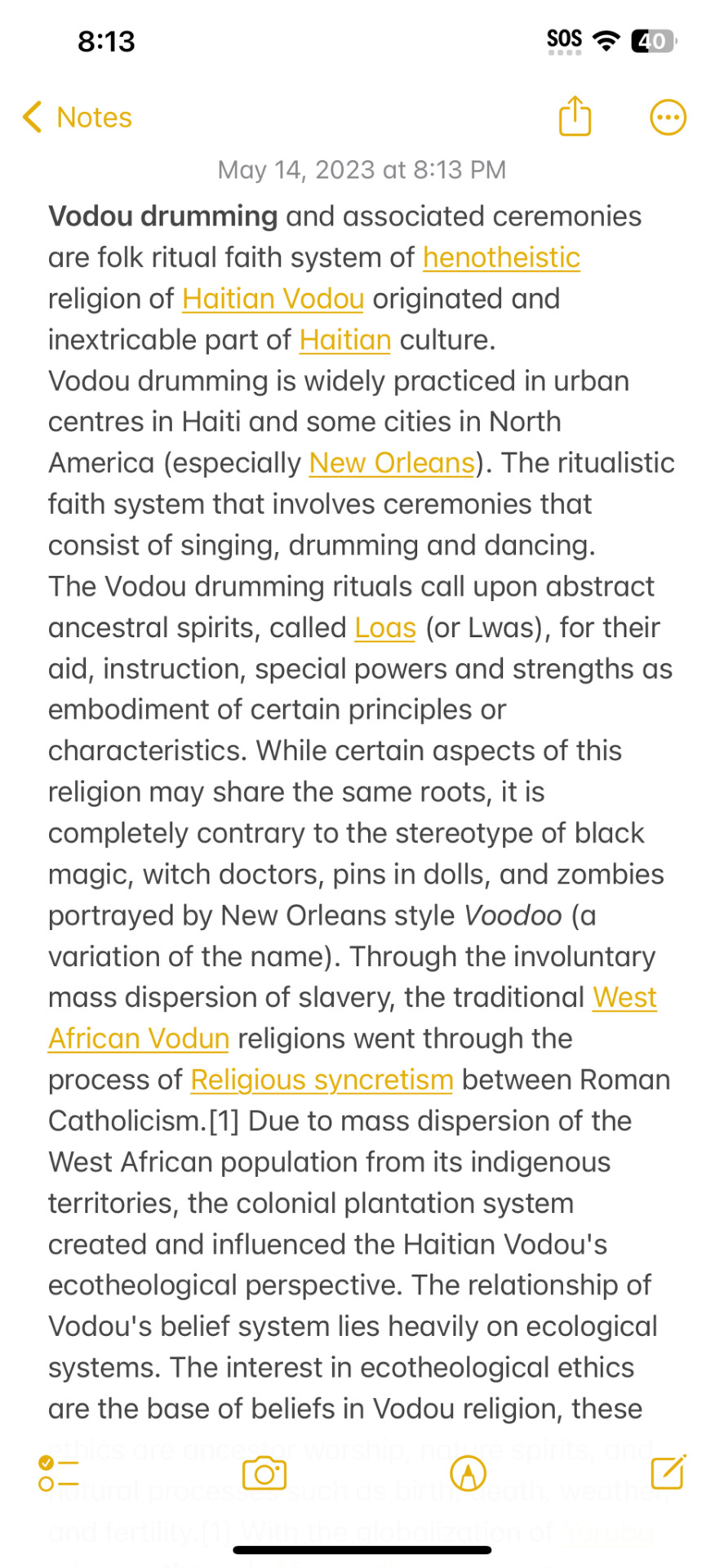
Vodou drumming and associated ceremonies are folk ritual faith system of henotheistic religion of Haitian Vodou originated and inextricable part of Haitian culture.
Vodou drumming is widely practiced in urban centres in Haiti and some cities in North America (especially New Orleans). The ritualistic faith system that involves ceremonies that consist of singing, drumming and dancing.
The Vodou drumming rituals call upon abstract ancestral spirits, called Loas (or Lwas), for their aid, instruction, special powers and strengths as embodiment of certain principles or characteristics. While certain aspects of this religion may share the same roots, it is completely contrary to the stereotype of black magic, witch doctors, pins in dolls, and zombies portrayed by New Orleans style Voodoo (a variation of the name. Through the involuntary mass dispersion of slavery, the traditional West African Vodun religions went through the process of Religious syncretism between Roman Catholicism. [1] Due to mass dispersion of the West African population from its indigenous territories, the colonial plantation system created and influenced the Haitian Vodou's ecotheological perspective. The relationship of Vodou's belief system lies heavily on ecological systems. The interest in ecotheological ethics are the base of beliefs in Vodou religion, theses CLONES
2 notes
·
View notes
Text
DEFINING HINDUISM

Though I've been an atheist and still am one. Being born into a Hindu family has always made me proud. And the reason for this is that, after decades of research on spiritualism, particularly how it began and evolved from India through the Hindus, I've concluded. Hinduism is more than just a religion. So, if you're interested in understanding more about Hinduism and its nuances, let me tell you about my understanding of Hinduism.
In my view, a Hindu is an atheist, polytheist, monotheist, and henotheist. He is henotheistic because he believes in only one God yet acknowledges the presence of other deities and subsidiary gods. For example, while Shiva is the most superior Hindu god, Hindus also worship many other lesser gods to whom there is no end or limit. This means that a Hindu can pray to anything around - a tree, a cow, a mountain, a stone or a river.
This distinguishes Hinduism from all other religions. It is a philosophy, even though now muddled up with supernatural beliefs and traditions. Hinduism cannot be called a religion. It's a way of life for them. It arose from various interconnected thoughts such as demographics, cultural practices, and ancient philosophical scriptures and teachings.
It evolved over thousands of years and is the oldest known religion globally. All beliefs and myths add up from one generation to another—philosophers, pundits, commentators, interpreters, gurus, etc.
Each of them comes up with their names, concepts, and supernatural beliefs. Many religions, including a subset of religions, have been influenced by Hinduism, including Sikhism, Jainism, Buddhism, etc. I'd go so far as to say it's the mother of all religions.
According to Yajurveda, "All living beings are equally divine." As a result, when all living creatures are equally divine, and the Hindu religion accepts everyone and allows other religions to coexist in its embrace, it must have been the mother of all ideologies.
Add to that the fact that there is no conversion in Hinduism from one religion to another. It also doesn't have a founder or any precepts. It consists solely of Mahavakyas or great sayings.
The Hindus in Hinduism
Let's take a closer look at the term "Hindu." The Persians coined the term "Hindu," which they used to describe the people who lived beyond the Shindus River. They couldn't distinguish between the sounds "SA" and "Ha" when pronouncing the word Sindhu, So Sindhu turned Hindu.
As you must have noticed, there is no -ism in it. The term "Hinduism," which relates to the Hindu people's religion, was coined later. They could not understand its true nature as an outsider looking in and just called it a religion. Hinduism is a way of life, not a religion, to realise one's full potential.
God in Hinduism is that of pure consciousness. A final destination for Aatma (the soul) to realise absolute awareness. In Hinduism, unlike any other faith, the Creator and creation are the same. There is no distinction. Since you have that divinity within you, you are that potential divine. This means God is the highest state of pure consciousness to liberate the human body and mind we call Moksha.
The above implies that the divine exists because of you, the earth exists because of you, the universe exists because of you, and everything exists because of your aware-conscious energy contained in the soul. You, as the potential divine, came first, and god followed.
The Knowledge of Self
In Hinduism, this is what is divine. So, with this spiritual knowledge, the most crucial thing in life is not to follow traditions but self-knowledge for that self-awakening to realise self-awareness of who we are beyond body and mind. This self-awareness teaches you that God, Guru, and the Self are one. Advaita Vedanta is the name given to that absolute non-dual state of aware energy; the supreme ability of energy - Brahman referred to as Parabrahman or Paramatma; par meaning beyond.
All of this sprang from four Upanishad mahavakyas. When they declared, "Prajnanam Brahma," - Insight is the creator of everything in the cosmos (Brahman). The second, "Ayam Aatman Brahma", is Brahman - the Soul, which contains the spirit. Third, "Tat Tvam Asi" - That art Thou, and the fourth is "Aham Bhramasmi," which means "I am that Brahman, the one in many and the many in One - total energy.
The Vedas are the foundational texts of Hinduism; it concludes with Advaita Vedanta, which is the essence and philosophical knowledge of the Upanishads.
Let us now consider how supreme and sublime the entire concept of Hinduism's scriptures is. Perhaps this is why the Upanishads offered us four life goals to follow.
These four goals in life are Dharma, Artha, Kama, and Moksha.
· One of the numerous meanings of Dharma is righteousness, which means the divine order of the human person.
· The second purpose is Artha, which aims for economic growth.
· The Kama is the third. It is to fulfil your essential desires and, finally, to be satisfied.
· The ultimate objective for Hindus is to achieve Moksha or liberation.
Sanatan Dharma is the actual name of Hinduism. Sanatana is Sanskrit for "eternal law." And Dharma is the order of righteousness, formed by combining two words into one.
As to how?
Dharma refers to how you should live, whereas karma refers to how you are already living, with the Sanatan – eternal laws filling in the gaps.
The universal law of eternity, the universal rule of righteousness, the universal law of non-duality, where there is no duality or relativity; because the truth, God, and everything else is related towards duality in our mind to its opposite?
All you need to do now is awaken that God, the Atma, in the centre. So that the soul can check and guide the mind to make it alert, attentive and aware to progress from lower to higher consciousness towards non-duality in absoluteness for that ultimate fulfilment.
Therefore, Hinduism is different from all other religions. It teaches you that salvation is found more in your religiousness, devoutness in religiosity. To awaken and liberate from the clutches of the material mind experiencing to realise that the God Guru and the actual Self are lying dormant within.
Namaste, and thank you once again for giving me your precious time.
#hinduism#sanatandharma#vedas#upanishads#atman#brahman#advaitavedanta#selfknowledge#moksha#dharmic#divineconsciousness#karma#polytheism#hinduphilosophy#henotheism#spiritualism#vedicwisdom#ancientreligion#wayoflife#motherofallreligions.#Spotify
2 notes
·
View notes
Text

Parsing design ideas for Commander Tabris and the mabari + having your pets participate in cultural traditions with you
None of these are canon to him yet and still in their early iterations. Notes below the readmore
Novhen’s outfit here is from a drawing i’ll be including in my next sketch dump whenever that will be. Primarily, i’m trying to design a leather Warden Scout armor, since metal is so loud. The general pattern is based on some of the Fereldan armors from the other games. It makes most sense to me that the different branches would have some degree of variation between their uniforms. It’s more obviously Warden when he doesn’t have that tartan on top (as will be seen in the sketch dump)
I’m undecided if he wears his kippah in everyday life or just for certain occasions. Given the setting, the elves probably mirror a more Orthodox community, so atm i’m starting to lean more everyday. But also there’s a question of what parameter the kippahs should be associated with. It’s the city elves who are the most Jewish-coded, but they mostly practice the human religion of Catholicism-with-extra-steps, even if they still infuse it with some of their own traditions. I have headcanoned a few pockets of elven religions within the alienages. Novhen does belong to one of them, and while not strictly monotheistic, it is monolatrist (or henotheistic? I always mix the two up). Problem there is that single deity is Fen’Harel. Maybe not the best deity to be attaching too many Jewish customs to. For now, i’m tying it most to the alienage culture rather than elves as a whole or any specific religion
This tartan is the “official” one (insofar as i just made it up) of the Grey Wardens. Calenhad has a tartan in his art, so i think they should be more commonplace in Ferelden. Most are just regional patterns based on local materials, but the different noble houses and certain organizations (such as the Wardens) also have their own. He also has one to represent his position as Arl of Amaranthine, but only wears one over the armor if the occasion demands it. He’s not a fan of ceremony (Might change if i can find a better-looking way to incorporate it. This is what iterations are for after all. Also, tartans in his casual clothing are another matter. Oh god, am i going to trick myself into making another outfit sheet D:)
I am inexperienced drawing animals (those eyes...), but what i am trying to do is draw a kaddis pattern for the Grey Wardens. Something griffony. I think i remember something about different kaddis patterns indicating loyalties. If i’m making that up, i’m keeping it regardless. Definitely will have to give it a few more passes though, probably will paint over official art or a screenshot at a better angle
#dragon age#novhen tabris#griffon the mabari#i catch a single glimpse of the canon culture of thedas and the ''i will take the hammer and fix the baby'' instinct takes over#i hope it's fixing at least#it's less bland if nothing else#the focus was on the designs not the grand sum of the piece be nice#only i'm allowed to criticize my art#also this was a cooldown piece over a couple days so polish was decidedly not an endgoal
8 notes
·
View notes
Text
Reading about oaths, commitments, and relationships to deities and spirits has my avid interest right now. I had a relationship with deity for a good twenty years. It was pre-packaged and spoonfed, but the heart of it was genuine.
Now for the first time since I reached the age of reason I have no gods. It is a new experience and oddly reminiscent of being romantically/ sexually single--something else I haven't experienced for north of fifteen years! Though I don't feel connections to deity and romantic relationships to be otherwise comparable in my life, I approach both from a desire to share love. There is a kind of devotional relationship that I want to have, but no one in my life that I am ready to have it with.
At the same time I am constitutionally incapable of rushing it. I have no idea whether I'll end up circling back to my old god on new terms, or whether I'll build henotheistic connections and share my love for the divine among several faces new to me. The traditions I am working from are so flexible as to be of no help with this matter; I know that this is truly between me and the powers.
I have a feeling that I am not ready yet, but the ache is growing.
5 notes
·
View notes